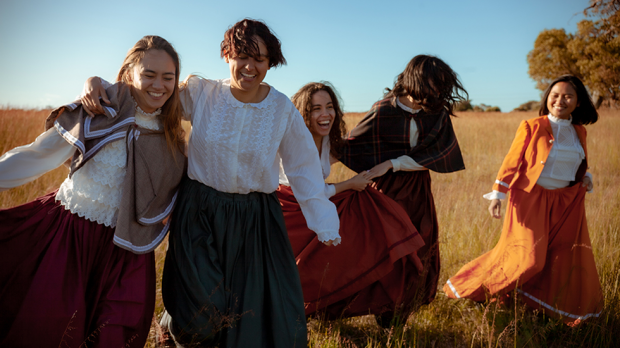
Little Women @ The Blue Room Theatre
Friday, November 12, 2021
Melanie Julien-Martial and Sally Davies’ writing, directing (and queering) of Louisa May Alcott’s novel, Little Women, was beautiful.
The “classics” often centre around white, cis characters with heteronormative stories which can ostracise minorities and perpetuates a lack of representation, especially as we continue to perform them without change. This production aimed to subvert these dominant narratives through rewriting the classic as queer and having a diverse cast.
Cezera Critti-Schnaars (Jo), Mani Mae Gomes (Beth), Jess Nyanda Moyle (Meg), Amber Kitney (Amy) and Ramiah Alcantara (Laurie) all took on this vision and ran with it. They played the familial characters exceptionally well, taking up spaces that are white dominated and subverting tradition. They brought out the themes of love, loss, heartache, sisterly bonds, dreams and aspirations, but added to the source material by masterfully exploring identity and denial, sexuality and gender.
Critti-Schnaars was the perfect match for Jo, fiery and obsessed with freedom, effortlessly breaking the fourth wall to write the story as her own. The sisterly bond between the girls could be felt by the audience as the characters experienced love and loss, as emotions rose and fell.
The dialogue between the sisters really amplifies the dominant narrative of the time, in which women were expected to be quiet, selfless, mild-tempered, and marry wealthy. Davies was able to weave feminist undertones into their retelling, shining a light on historical expectations of women and gender.
Ramiah Alcantara (Laurie) provides the queer narrative creatively and passionately, bringing out the queerness in the other characters and transforming the narrative. Although queer sexuality was portrayed openly and unapologetically, unlike what would be typical in that era, this suspension allowed for a richer exploration of the characters.
Jo, rejecting traditional ideas of marriage and leaving someone you love due to not accepting your sexuality. Laurie, pursuing a friendship over admitting your feelings and feeling like you’ll never find love. Through Laurie’s character, the play cleverly exposed norms that we accept men can get away with and women to accept. It felt jarring that Laurie would manipulate love in a way when portrayed as a woman rather than a man.
Representation of the queer community has only really started to emerge into mainstream theatre and arts in recent years. Shows like these being performed, taking up space, and inviting the general public to see a different perspective on what it means to be queer, are essential to making people feel seen and heard. This play proves that the classics can be rewritten with diverse representation in mind.
ELLA WYLYNKO